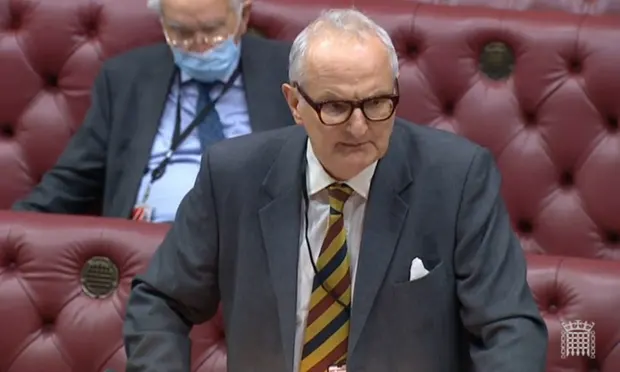Aubrey Allegretti Political correspondent
Lord Agnew said Treasury measures to tackle fraudulent Covid business loans were a ‘Dad’s army operation’
Treasury officials trying to stop fraudsters making off with vast Covid loans have been called a “Dad’s Army operation” by a former Tory minister who condemned the lacklustre bid to stop “suitcases of cash leaving the country”.
Lord Agnew, who quit as the government’s anti-fraud minister earlier this year, said the first few months of taxpayer-funded emergency loans being issued were “happy days for crooks”.
In an eviscerating assessment of the government’s attempt to avoid the loans being given to untraceable companies, Agnew said he was “genuinely completely dumbfounded” why the operation was not properly resourced.
He revealed it took officials six weeks to create a system that could catch fraudsters making duplicate claims for the loans, which were designed to keep businesses afloat. However, he added by that time “60% of the money had already gone out of the door”.
He recalled: “I was writing letters of congratulations to Border Force staff for picking up suitcases of cash leaving the country. It was happy days if you were a crook in those first few months.”
Out of a potential 100,000 fraud cases, Agnew said just 49 had resulted in arrest – a figure he branded a “disgrace”.
He claimed the economic crime bill, passed by MPs on Monday, was a “start” but only fixed around a quarter of the problems that needed solving in tackling serious offences, such as money laundering.
Agnew admitted he was “very worried” that ministers would claim the bill would solve all the issues and warned that would be an “absolute tragedy”.
In a direct attack on the most senior civil servant in the Treasury – the department in which Agnew used to be a minister – he also said that a letter he received from Tom Scholar “embodies everything about the complacency that grips the civil service”.
It comes two months after the Treasury confirmed it had written off £4.3bn worth of the £5.8bn of fraud witnessed across its Covid business loan schemes.
Agnew said he quit because he was asked to defend the move, but decided he “could not stand up with any great integrity and say that we’d done a great job, because we hadn’t”.Advertisement
Speaking to the Treasury select committee on Wednesday, Agnew said the Back Bounce Loan Scheme was an “important intervention” to help keep small and medium-sized firms afloat when tough restrictions were in place that forced them to close.
“We had to get the money out quickly to legitimate businesses and give them the support they needed,” he said. “But on the fraud side it was just a Dad’s Army operation.”
Agnew said the economic crime bill – heralded by the government as a key move to help tackle dirty money being laundered in the UK – was a start, but added: “This shouldn’t really be called an economic crime bill, because it’s about tightening up some Land Registry disclosures …
“This only deals with probably 25% of what needs to be done. The Companies House situation is simply terrifying – the gaping holes that exist there in terms of their inability to carry out any proper anti-money-laundering checks on people applying for a company.”
Agnew also said the head of fraud at the British Business Bank had recently “resigned out of frustration because she was not getting supported” in bids to ensure “a much harder set of reporting standards from the banks”.
He also dismissed as “total drivel” and a “classic fob off” explanations by the government about why it would not publish a list of the businesses that received loans.
The Treasury has been contacted for comment.
Source:theguardian.com


